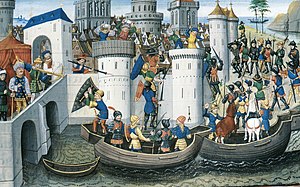 The Fourth Crusade (1202–04) was a Western European armed expedition called by Pope Innocent III, originally intended to reconquer Muslim-controlled Jerusalem by means of an invasion through Egypt. Instead, a sequence of events culminated in the Crusaders sacking the city of Constantinople, the capital of the Christian-controlled Byzantine Empire.
The Fourth Crusade (1202–04) was a Western European armed expedition called by Pope Innocent III, originally intended to reconquer Muslim-controlled Jerusalem by means of an invasion through Egypt. Instead, a sequence of events culminated in the Crusaders sacking the city of Constantinople, the capital of the Christian-controlled Byzantine Empire.
In January 1203, en route to Jerusalem, the majority of the crusader leadership entered into an agreement with the Byzantine prince Alexios Angelos to divert to Constantinople and restore his deposed fatheras emperor. The intention of the crusaders was then to continue to the Holy Land with promised Byzantine financial and military assistance. On 23 June 1203 the main crusader fleet reached Constantinople. Smaller contingents continued to Acre.
In August 1203, following clashes outside Constantinople, Alexios Angelos was crowned co-Emperor (as Alexios IV Angelos) with crusader support. However, in January 1204, he was deposed by a popular uprising in Constantinople. The Western crusaders were no longer able to receive their promised payments, and when Alexios was murdered on 8 February 1204, the crusaders and Venetians decided on the outright conquest of Constantinople. In April 1204, they captured and brutally sacked the city, and set up a new Latin Empire as well as partitioning other Byzantine territories among themselves.
and Epirus ultimately recovered Constantinople in 1261. The Fourth Crusade is considered to be one of the more prominent acts in the Great Schism between the Eastern Orthodox Church and Roman Catholic Church, and a key turning point in the decline of the Byzantine Empire and Christianity in the Near East.
No comments:
Post a Comment